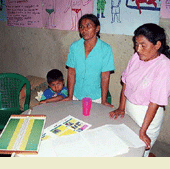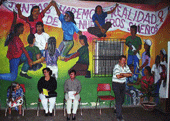
Mobilizing Communities for Obstetric and Neonatal Emergencies
“If it is a birth I cannot attend alone, I look for help. When there is no emergency vehicle, I find the person on call to help me take the patient.”
Felipa Arteta, a traditional birth attendant in rural Nicaragua, has learned how to assess whether she can assist with a complicated birth, enabling her to better serve her community. Arteta received training in emergency obstetric and neonatal care through a program designed by the PRIME II Project and local partners to strengthen community responses to obstetric and neonatal emergencies in the mountainous Jinotega region.
Encouraged by her trainers to “learn and evolve,” Arteta enjoys her expanded role as a coordinator of birth plans for pregnant women and emergency complications readiness efforts in Venicia, her small community. She found the training sessions practical and easy to apply in the real-life situations she faces. Along with standards for the birthing process and postpartum care, the training addressed danger signs in pregnancy and caring for a mother and baby during a birth with complications.
“When we were in the training, we talked about what we would do in these cases,” Arteta emphasizes. “What to do when a birth becomes abnormal, when there are problems with bleeding, or if it is a birth we cannot assist.” Community-based life-saving skills modules developed by PRIME supporting institution, the American College of Nurse-Midwives, are the basis for preparing the traditional birth attendants and clinical providers to deal with emergencies at the local level.
The program in Jinotega also works to improve community and clinic response to the family planning needs of postpartum women and facilitate an ongoing census of pregnant women in the region. At the national level, PRIME is assisting in the development of emergency obstetric and neonatal care protocols. PRIME II project partners in Nicaragua include the Ministry of Health, NGO Networks, NicaSalud, Project Hope, Project Concern International, Wisconsin-Partners of the Americas, Catholic Relief Services, Management Sciences for Health and the Quality Assurance Project.
Results from a mid-term evaluation of the program demonstrate significant improvement in provider performance. As defined by a quality index score, care of immediate postpartum women by traditional birth attendants has improved 87%. Management of postpartum hemorrhage by physicians, nurses and auxiliary nurses has risen 20%. These positive results for providers have been matched by community efforts. In the 32 project areas, 78% of planned emergency obstetric and neonatal care community committees have been organized. Emergency transportation systems have been established in 56% of communities and emergency funds set aside in 25%. A census of pregnant women is available in 81% of the communities, and 47% have implemented birth and complications readiness plans.
In Venicia, emergency funds are being administered by a community committee and someone with a vehicle is now on call at all hours to transport women to the nearest hospital in cases of emergency. In addition to assisting with deliveries, Felipa Arteta visits pregnant women at their homes to provide prenatal care and help them create birth and emergency complications readiness plans. As Arteta sums up, the knowledge and skills she acquired through training have enhanced her ability to “do a little bit to help in this world.”
The PRIME II Project, funded by USAID and implemented by IntraHealth International and the PRIME partners, works around the world to strengthen the performance of primary-care providers as they strive to improve family planning and reproductive health services in their communities.
PRIME Voices #19, Nicaragua: Mobilizing Communities for Obstetric and Neonatal Emergencies, 5/20/03.
|












